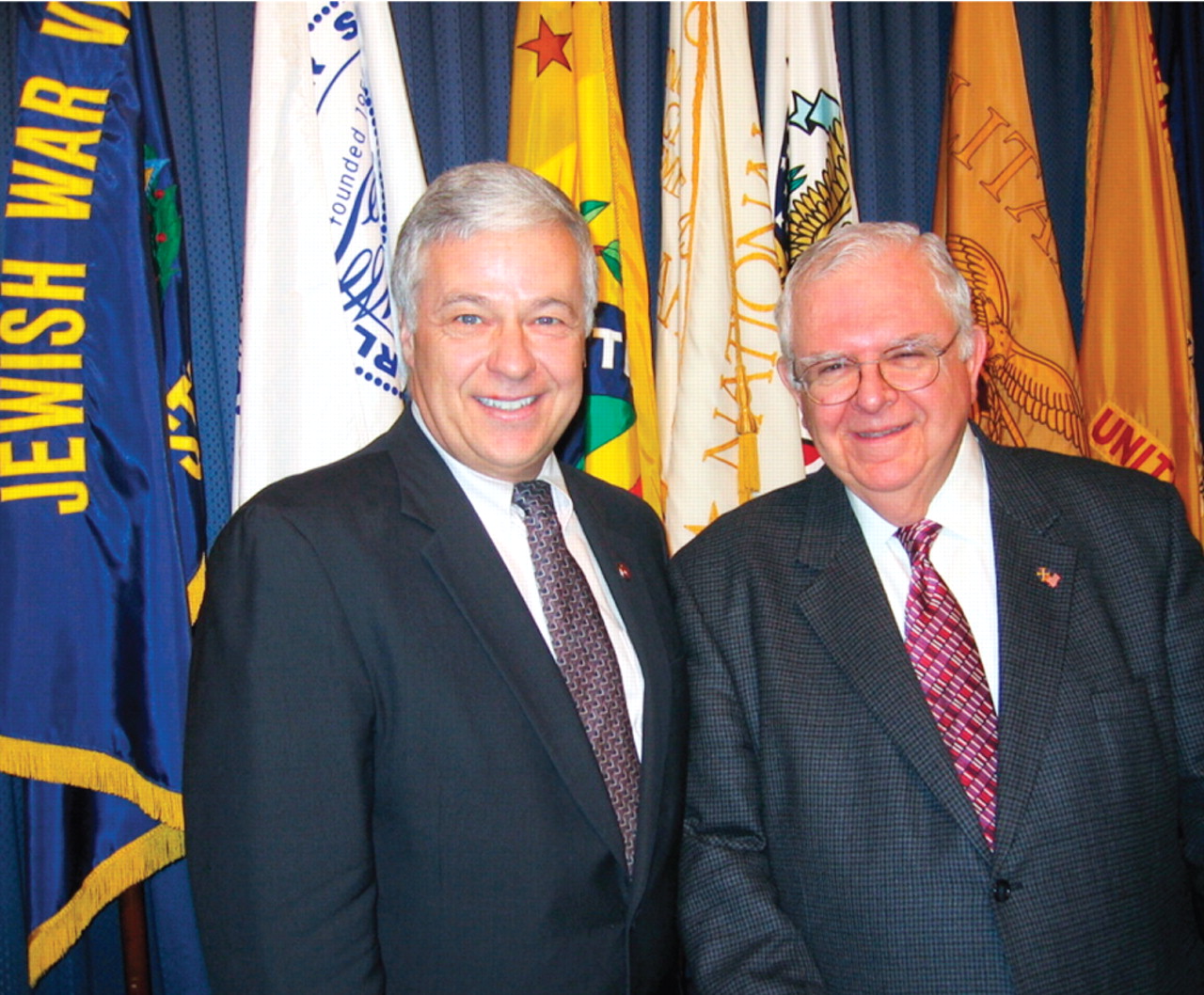APA Urges More Money, Attention To MH Needs of Returning Vets

APA former President Joseph T. English, M.D. (right), stands with Rep. Michael Michaud (D-Maine) after a hearing of the House Veterans Affairs Subcommittee on Health last month. Michaud is chair of the subcommittee. English, who testified on behalf of APA, urged Congress to increase VA funding for research and services.
Credit: Joseph T. English, M.D.
Soldiers with even mild cases of the closed head injuries commonly occuring in Iraq and Afghanistan should be identified now and followed to observe later onset of psychiatric symptoms or early development of Alzheimer's or Parkinson's disease, former APA President Joseph T. English, M.D., told the House Veterans Affairs Subcommittee on Health on February 14.
“We don't want to have people arguing 10 years from now that these illnesses are not service connected when there is great concern that these injuries may have such an effect on earlier onset,” said English, speaking on behalf of APA.
The Bush administration has requested a 6 percent increase for Fiscal 2008 over the Department of Veterans Affairs (VA) current budget of $36.6 billion. APA supports a general increase of an additional $500 million in every fiscal year until 2012, said English.
While expressing overall approval of the VA's work on mental health, English emphasized the expected high rate of mental health consequences from the fighting in Iraq and Afghanistan.
He pointed to research showing that veterans who suffered mild brain injuries went undiagnosed immediately after the explosions causing their injury, but remained vulnerable to later diagnosis of PTSD or other mental disorders.
“Our concern is that there is not enough research on the long-term effects of closed head traumatic brain injury, the effects of which may not appear for many years,” he said.
The hearings took place at an early stage in the budget process, but House members in attendance appeared interested in soliciting the views of organizations representing veterans and health care providers. Subcommittee Chair Rep. Michael Michaud (D-Maine) will be a featured speaker during APA's Advocacy Day on Capitol Hill March 20.
“The VA should coordinate with the Department of Defense to develop standardized follow-up protocols with appropriate clinical assessment methods to identify neurological or behavioral consequences of traumatic brain injury [TBI],” said English, adding that research funding should begin as soon as possible.
Besides research on TBI, the VA and the Defense Department should improve collaboration on a seamless transition for providing care as“ soldier-families” become “veteran-families.” Stronger mental health parity laws covering private health insurers are needed to improve access to care for members of the National Guard and Reserves, who often live in rural areas far from VA hospitals. Only an informal network of support groups is available now to help families develop the skills to cope when a soldier has PTSD, English told the committee.
“We are also concerned about disparities in care due to the remaining stigma about mental illness among some in the VA beauracracy, as well as concern about psychiatric care and patient safety,” English said.“ Many families need help in understanding what financial aid and other benefits are available to them and how to receive them in a timely way. The description of the benefits and eligibility for them can vary from one VA region to another, confronting families with difficult problems.”
Appearing on the panel with English, Sgt. Patrick Campbell, a medic with the District of Columbia National Guard, went a step farther, saying that every soldier “needs and deserves mandatory mental health counseling.”
Campbell is now a law student and testified as legislative director for the Iraq and Afghanistan Veterans of America. He recounted his own experience after returning home from a tour of duty in Iraq, where he survived 16 mortar or roadside-bomb attacks.
“I saved many lives but I lost too many,” he told the subcommittee. “Watching someone die in my hands because of a mistake I made was horrible.”
He thought he was safe and sane when he got back to the United States, but he was wrong, he said. Like many returning troops, Campbell drank too much and alienated his friends. Only when they threatened never to speak to him again did he seek help.
Recently he was diagnosed with PTSD, and he said he is still getting used to the label.
A mandatory mental health care requirement would not only find those who need help but also remove the stigma and disincentives that accompany requests for help through regular military channels, he said.
His own captain told members of his company to answer truthfully the mental health questions on the postdeployment health assessment form that all soldiers fill out, but then said that anyone checking off a mental health issue would stay at the base while all the others would go home.
Campbell proposed requiring mental health consultations for returning troops or offering financial or other incentives to urge them to go to a Vet Center within six months of their release from active duty.
“We need to reject the assumption that soldiers who need help the most will ask for it,” he said.
English sympathized with Campbell's views but said that some troops might resent a mandatory mental health program and hoped a middle way might be found.
He cited his experience as the first psychiatrist for the Peace Corps four decades ago, when he instituted “completion-of-service conferences” to help returning volunteers get through reverse culture shock when they came back to the United States. Those group sessions helped volunteers understand their overseas experiences, but interviewers also raised questions about psychological difficulties and how they can be overcome. He suggested that an expanded version of those exit interviews might be adapted for use with returning troops. ▪



